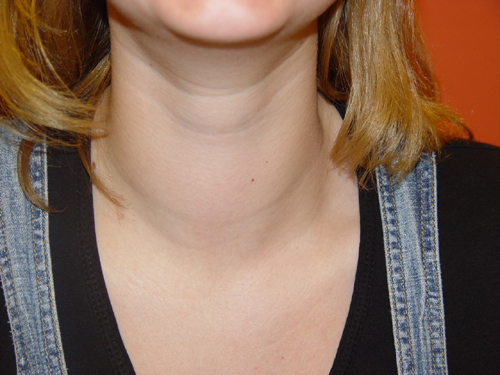How Simple Goitre Develops: A Closer Look At Thyroid Enlargement
A simple goitre, an enlargement of the thyroid gland, is a common condition affecting people worldwide. The thyroid, a small butterfly-shaped gland located in the neck, plays a crucial role in regulating metabolism through the production of thyroid hormones. When this gland enlarges without inflammation or malignancy, it is termed a simple goitre. Understanding how simple goitre develops requires a closer look at the thyroid gland’s function, the causes of its enlargement, and the factors contributing to this condition.
Anatomy and Function of the Thyroid Gland
The thyroid gland is an essential part of the endocrine system, responsible for producing and releasing hormones that regulate various bodily functions. Thyroxine (T4) and triiodothyronine (T3) are the two main hormones that the thyroid produces. These hormones control the body’s metabolic rate, influencing heart function, digestion, muscle control, brain development, and bone maintenance. The production of these hormones is regulated by the pituitary gland, which releases thyroid-stimulating hormone (TSH) to signal the thyroid to produce more T3 and T4.
Development of Simple Goitre
The development of a simple goitre typically occurs when the thyroid gland attempts to compensate for a deficiency in thyroid hormone production. This compensation mechanism leads to the enlargement of the gland. Several factors can contribute to this process:
Iodine Deficiency
Iodine is a vital component in the synthesis of thyroid hormones. When there is an insufficient amount of iodine in the diet, the thyroid cannot produce adequate levels of T3 and T4. In response, the pituitary gland increases the secretion of TSH to stimulate the thyroid. Prolonged stimulation causes the thyroid cells to grow and multiply, leading to the enlargement known as goitre. Iodine deficiency is the most common cause of goitre globally, particularly in regions where the soil and water are low in iodine.
Goitrogens
Certain substances, known as goitrogens, can interfere with thyroid hormone production and contribute to the development of goitre. Goitrogens are found in various foods, including cruciferous vegetables (such as cabbage, broccoli, and cauliflower), soy products, and certain medications. These substances inhibit the uptake of iodine by the thyroid gland, disrupting hormone synthesis and causing the gland to enlarge in an attempt to compensate.
Hormonal Changes
Hormonal changes, especially during puberty, pregnancy, and menopause, can affect thyroid function and lead to the development of goitre. During these periods, the body requires more thyroid hormones to support increased metabolic demands. If the thyroid cannot meet these demands, it may enlarge in response to elevated TSH levels.
Genetic Factors
Genetic predisposition can also play a role in the development of simple goitre. Some individuals may have a genetic variation that makes their thyroid gland more susceptible to enlargement in response to hormonal imbalances or iodine deficiency.
Environmental Factors
Environmental factors, such as exposure to certain chemicals or pollutants, can influence thyroid function and contribute to the development of goitre. For example, exposure to perchlorate, a chemical found in some water sources, can disrupt iodine uptake by the thyroid gland, leading to its enlargement.
Symptoms and Diagnosis
The primary symptom of simple goitre is the visible enlargement of the thyroid gland, which may appear as a swelling in the front of the neck. In most cases, the goitre is painless, but it can cause discomfort or pressure in the neck. In severe cases, it may compress surrounding structures, leading to difficulty swallowing or breathing.
Symptoms
- Visible Swelling: The most noticeable symptom is the swelling in the neck, which can vary in size.
- Tightness in the Throat: Some individuals may feel a sense of tightness or fullness in the throat.
- Difficulty Swallowing or Breathing: Large goitres can press on the esophagus or trachea, causing swallowing or breathing difficulties.
- Coughing or Hoarseness: Compression of the larynx or recurrent laryngeal nerve can result in coughing or a hoarse voice.
Diagnosis
To diagnose a simple goitre, healthcare providers typically perform a physical examination and may order additional tests:
- Physical Examination: The doctor will palpate the neck to assess the size and texture of the thyroid gland.
- Blood Tests: These tests measure levels of TSH, T3, and T4 to evaluate thyroid function.
- Ultrasound: An ultrasound can provide detailed images of the thyroid gland, helping to determine the size and structure of the goitre.
- Thyroid Scan: This imaging test involves the use of radioactive iodine to visualize the thyroid gland and assess its function.
Treatment and Management
The treatment for simple goitre depends on the size of the goitre, symptoms, and underlying cause. In many cases, if the goitre is small and not causing symptoms, no treatment may be necessary. However, if the goitre is large or causing discomfort, several treatment options are available:
Iodine Supplementation
For goitres caused by iodine deficiency, iodine supplementation is often recommended. This can be achieved through dietary changes, such as increasing the intake of iodine-rich foods (like seafood, dairy products, and iodized salt) or taking iodine supplements.
Thyroid Hormone Replacement
If the goitre is due to hypothyroidism (an underactive thyroid), thyroid hormone replacement therapy with levothyroxine can help normalize hormone levels and reduce the size of the goitre.
Surgery
In cases where the goitre is large, causing significant symptoms, or has the potential for malignancy, surgical removal of part or all of the thyroid gland (thyroidectomy) may be necessary.
Radioactive Iodine Therapy
Radioactive iodine therapy can be used to shrink the thyroid gland in cases of goitre with hyperthyroidism (an overactive thyroid). The radioactive iodine is taken up by the thyroid cells, causing them to shrink and reducing the size of the goitre.
Prevention
Preventing simple goitre primarily involves ensuring adequate iodine intake. This can be achieved by consuming a balanced diet that includes iodine-rich foods and using iodized salt. Public health measures, such as iodine fortification programs, have been effective in reducing the prevalence of goitre in many regions.
Conclusion
Simple goitre, an enlargement of the thyroid gland, develops due to various factors, including iodine deficiency, goitrogen exposure, hormonal changes, genetic predisposition, and environmental influences. Understanding the underlying causes and mechanisms of thyroid enlargement is crucial for effective diagnosis, treatment, and prevention. By ensuring adequate iodine intake and addressing contributing factors, the risk of developing a simple goitre can be significantly reduced, promoting better thyroid health and overall well-being.







